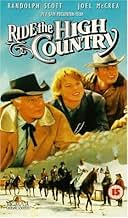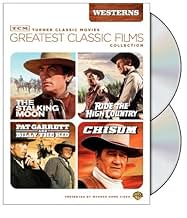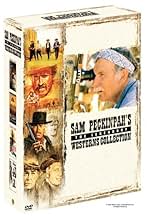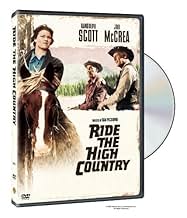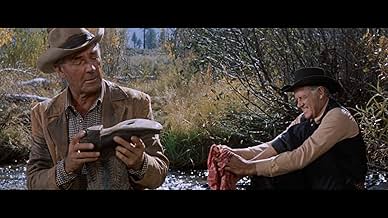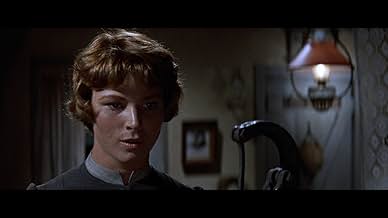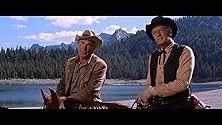CALIFICACIÓN DE IMDb
7.4/10
15 k
TU CALIFICACIÓN
Un exsoldado de la Unión es contratado para transportar el oro de una comunidad minera a través de un territorio peligroso sin que su socio y viejo amigo tiene otros planes.Un exsoldado de la Unión es contratado para transportar el oro de una comunidad minera a través de un territorio peligroso sin que su socio y viejo amigo tiene otros planes.Un exsoldado de la Unión es contratado para transportar el oro de una comunidad minera a través de un territorio peligroso sin que su socio y viejo amigo tiene otros planes.
- Nominada a1 premio BAFTA
- 2 premios ganados y 2 nominaciones en total
Alice Allyn
- Candy
- (sin créditos)
George Bell
- Townsman
- (sin créditos)
Oscar Blank
- Miner
- (sin créditos)
Chet Brandenburg
- Miner
- (sin créditos)
Don Brodie
- Spieler
- (sin créditos)
Chris Carter
- Rose
- (sin créditos)
- Dirección
- Guionistas
- Todo el elenco y el equipo
- Producción, taquilla y más en IMDbPro
Argumento
¿Sabías que…?
- TriviaFinal film of Randolph Scott. He retired from acting once he saw the finished film, saying he wanted to quit while he was ahead and that he would never be able to better his work here.
- ErroresThe many 34-star flags, all on flagpoles, at the opening of the movie do not match the Bobby helmets, open automobiles and electric wiring over the streets. The 34-star U.S. flag was in use only from 1861-1863. There is, however, also an inconsistent 45-star flag strung across the street. That design, in use from 1896-1908, does match the movie's time setting.
- Citas
Steve Judd: All I want is to enter my house justified.
- Créditos curiososIntroducing Mariette Hartley
- ConexionesFeatured in America at the Movies (1976)
Opinión destacada
"In simple terms, Ride the High Country was about salvation and loneliness" - Sam Peckinpah
Both in their 60s at the time, Joel McCrea and Randolph Scott summed up their careers in Sam Peckinpah's second film, Ride the High Country. After two hundred films between them, this was Scott's final film and McCrea's second to last. The film was shot in only twenty-six days and played mostly as bottom filler for double bills. It was only after winning first prize at the Cannes Film Festival that it began to be appreciated for the true classic it is. Set in the early days of the century, the days of the cowpoke are giving way to the modern modes of transportation and communication. People like lawman Steve Judd (Joel McCrea), with a reputation for fierce integrity may be obsolete in the New West but his dignity and strength of character make him a hero worthy of admiration.
The film is both a lament for the passing of the Old West and a gentle celebration of humanity's search for friendship, honor, and trust. Both men feel they have somehow failed to live up to their standards and want one more chance to redeem their honor. Judd wants to recapture some measure of self-respect while Westrum looks for the material wealth that has always eluded him. As the film opens, Judd hires his ex-deputy Gil Westrum (Randolph Scott) to help him transport a shipment of gold bullion down from the high Sierras, a job in which six prior attempts ended in failure. Against Judd's advice, they bring along a third man - a wild, womanizing youth named Heck Longtree (Ron Starr), who proves to them that he can handle himself in a fistfight.
Things get complicated when they spend the night at a farm run by puritanical Joshua Knudson (R.G. Armstrong) and Heck is taken with his beautiful daughter Elsa (Mariette Hartley). Feeling thwarted by her possessive and moralizing father, Elsa runs away with the trio hoping to find a miner, Billy Hammond (James Drury) who has promised to marry her. As they ride up into the hills, the cinematography by Lucien Ballard reflects the beauty of the West as it has rarely been seen. When they arrive, things go from bad to worse for Elsa. Preceded by a marvelously comic horseback parade in which the boys sing When the Roll is Called Up Yonder, she is married to Billy in a saloon presided over by an inebriated judge.
Unfortunately, she has to be rescued by Judd after Billy Boy plans to share his bride with his four redneck brothers on their wedding night. The wedding scene is shown from Elsa's point of view and it is sympathetic and touching. On the way back with the gold, however, Gil turns on his old friend, plotting with Heck to steal the gold. In a famous exchange, Gil asks Judd, `Pardner, you know what's on the back of a poor man when he dies? The clothes of pride. Is that all you want?' To this Judd replies `All I want is to enter my house justified.' When the travelers encounter the Hammond boys waiting to ambush them at the farm, both men must confront their deepest fears and their noblest truths.
Both in their 60s at the time, Joel McCrea and Randolph Scott summed up their careers in Sam Peckinpah's second film, Ride the High Country. After two hundred films between them, this was Scott's final film and McCrea's second to last. The film was shot in only twenty-six days and played mostly as bottom filler for double bills. It was only after winning first prize at the Cannes Film Festival that it began to be appreciated for the true classic it is. Set in the early days of the century, the days of the cowpoke are giving way to the modern modes of transportation and communication. People like lawman Steve Judd (Joel McCrea), with a reputation for fierce integrity may be obsolete in the New West but his dignity and strength of character make him a hero worthy of admiration.
The film is both a lament for the passing of the Old West and a gentle celebration of humanity's search for friendship, honor, and trust. Both men feel they have somehow failed to live up to their standards and want one more chance to redeem their honor. Judd wants to recapture some measure of self-respect while Westrum looks for the material wealth that has always eluded him. As the film opens, Judd hires his ex-deputy Gil Westrum (Randolph Scott) to help him transport a shipment of gold bullion down from the high Sierras, a job in which six prior attempts ended in failure. Against Judd's advice, they bring along a third man - a wild, womanizing youth named Heck Longtree (Ron Starr), who proves to them that he can handle himself in a fistfight.
Things get complicated when they spend the night at a farm run by puritanical Joshua Knudson (R.G. Armstrong) and Heck is taken with his beautiful daughter Elsa (Mariette Hartley). Feeling thwarted by her possessive and moralizing father, Elsa runs away with the trio hoping to find a miner, Billy Hammond (James Drury) who has promised to marry her. As they ride up into the hills, the cinematography by Lucien Ballard reflects the beauty of the West as it has rarely been seen. When they arrive, things go from bad to worse for Elsa. Preceded by a marvelously comic horseback parade in which the boys sing When the Roll is Called Up Yonder, she is married to Billy in a saloon presided over by an inebriated judge.
Unfortunately, she has to be rescued by Judd after Billy Boy plans to share his bride with his four redneck brothers on their wedding night. The wedding scene is shown from Elsa's point of view and it is sympathetic and touching. On the way back with the gold, however, Gil turns on his old friend, plotting with Heck to steal the gold. In a famous exchange, Gil asks Judd, `Pardner, you know what's on the back of a poor man when he dies? The clothes of pride. Is that all you want?' To this Judd replies `All I want is to enter my house justified.' When the travelers encounter the Hammond boys waiting to ambush them at the farm, both men must confront their deepest fears and their noblest truths.
- howard.schumann
- 14 dic 2003
- Enlace permanente
Selecciones populares
Inicia sesión para calificar y agrega a la lista de videos para obtener recomendaciones personalizadas
Detalles
- Fecha de lanzamiento
- País de origen
- Idiomas
- También se conoce como
- Ride the High Country
- Locaciones de filmación
- Mammoth Lakes, California, Estados Unidos(Twin Lake, Horseshoe Lake)
- Productora
- Ver más créditos de la compañía en IMDbPro
Taquilla
- Presupuesto
- USD 813,000 (estimado)
- Tiempo de ejecución1 hora 34 minutos
- Color
- Relación de aspecto
- 2.35 : 1
Contribuir a esta página
Sugiere una edición o agrega el contenido que falta

Principales brechas de datos
What is the Hindi language plot outline for Pistoleros al atardecer (1962)?
Responda

